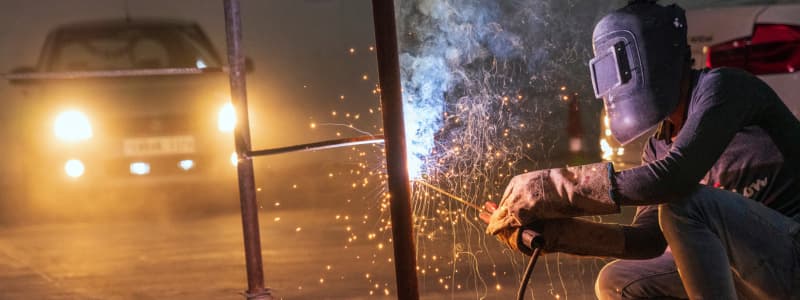A knowledgeable Welding Inspector can significantly contribute to your organization’s success. We provide 35 interview questions for Welding Inspector positions, covering an extensive range of technical topics related to welding inspection and welding engineering. These interview questions are designed to help you thoroughly assess candidates and ultimately recruit the best person for the role.
I. Welding Processes Interview Questions
1 – Explain the key differences between TIG, MIG, and SMAW welding processes and their advantages and limitations.
2 – How do different welding processes affect the metallurgical structure of a weld, and what are the potential consequences?
3 – How do you evaluate the weldability of different materials, such as carbon steel, stainless steel, and aluminum alloys?
II. Codes, Standards, and Specifications
4 – Describe the general structure of AWS D1.1 and its relevance to welding inspection.
5 – Can you explain the difference between WPS, PQR, and WPQ, and their significance in a welding project?
6 – How do you verify that a welding procedure is in compliance with ASME?
III. Welding Defects and Discontinuities
7 – Explain the differences between various types of weld defects, such as porosity, slag inclusions, and lack of fusion.
8 – How do you determine the acceptability of a welding defect based on the applicable code or standard?
9 – What are the primary causes of hydrogen-induced cracking, and how can it be prevented?
IV. Inspection Techniques and Procedures
10 – Describe the principles and applications of common NDT methods, such as radiographic testing (RT), ultrasonic testing (UT), and magnetic particle testing (MT).
11 – How do you develop an inspection plan for a welding project, considering the welding processes, materials, and applicable codes or standards?
12 – Explain the role of a Welding Inspector during each stage of a welding project (pre-weld, in-process, and post-weld).
V. Problem-solving and Decision-making Skills
13 – Describe a situation where you identified a critical welding defect and recommended appropriate corrective actions.
14 – How do you approach troubleshooting welding problems that involve distortion or warping?
15 – Explain how you would handle a situation where the specified welding procedure is inadequate or leads to unexpected issues.
VI. QA and QC Questions for Welding Inspectors
16 – How do you ensure that a welding project’s quality control measures are sufficient and effective?
17 – How do you verify that the welding equipment is calibrated and maintained according to industry standards?
18 – Explain the role of a Welding Inspector in a welding project’s quality assurance program.
VII. Welding Safety and Compliance
19 – How do you assess and ensure the safety of welders and other personnel during a welding project?
20 – Describe the importance of welder qualifications and certifications in maintaining compliance with industry standards.
21 – How do you ensure that a welding project’s documentation meets the requirements of the relevant codes and standards?
VIII. Scenario-based Questions for Welding Inspectors
22 – Explain how you would address a situation where the root cause of a weld defect is difficult to identify.
23 – How would you handle a discrepancy between the project specifications and the applicable code or standard?
24 – Describe your approach to a situation where a weld joint’s design appears to be inadequate or unsuitable for the application.
IX. Welding Inspector’s Role in Project Management
25 – How do you coordinate with project managers, engineers, and other stakeholders to ensure the successful completion of a welding project?
26 – What is your approach to managing changes in project scope or specifications that may impact welding inspections and quality control?
27 – How do you communicate inspection results and recommendations to non-technical stakeholders, such as project managers or clients?
X. Continuous Improvement and Professional Development
28 – How do you stay current with the latest advancements in welding technology and inspection techniques?
29 – Can you provide an example of how you have implemented a new technique or process to improve welding inspection efficiency or accuracy?
30 – What additional certifications or training do you plan to pursue to enhance your expertise as a Welding Inspector?
XI. Interpersonal Skills and Collaboration
31 – How do you handle disagreements or conflicts with welders, engineers, or other team members regarding inspection findings or recommendations?
32 – Describe a situation where you had to collaborate with other departments or disciplines to resolve a welding-related issue.
33 – How do you ensure effective communication and coordination between your inspection team and other project stakeholders?
XII. Future Goals and Growth Questions for Welding Inspectors
34 – What are your long-term career goals as a Welding Inspector, and how do you plan to achieve them?
35 – How do you envision contributing to the growth and improvement of our organization’s welding processes, quality control, and overall success?
Conclusion
Hiring the right Welding Inspector for your organization can be a challenging task, especially when seeking a candidate with advanced technical knowledge and experience. By using this comprehensive list of advanced interview questions for Welding Inspector positions, you can effectively evaluate candidates and ensure that you select the best person for the job. Remember to consider a candidate’s technical expertise, problem-solving abilities, communication skills, and commitment to professional growth, as well as their alignment with your company’s values. By doing so, you’ll be well on your way to hiring a Welding Inspector who will uphold the highest standards and contribute to the ongoing success of your organization.

